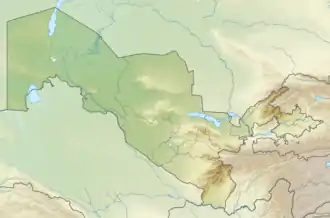Kurek Formation
The Kurek Formation (Russian: Kurek Svita) is a late Oxfordian (Late Jurassic) geologic formation of the Kugitang Svita in Turkmenistan and Uzbekistan. Fossil sauropod tracks have been reported from the formation.[1]
| Kurek Formation | |
|---|---|
| Stratigraphic range: Late Oxfordian ~ | |
| Type | Geological formation |
| Unit of | Kugitang Svita |
| Lithology | |
| Primary | Limestone |
| Other | Mudstone |
| Location | |
| Coordinates | 38.5°N 68.6°E |
| Approximate paleocoordinates | 43.2°N 73.2°E |
| Region | Lebap (Turkmenistan) Kashkadarya (Uzbekistan) |
| Country | |
| Type section | |
| Named for | Mount Kurek |
 Kurek Formation (Uzbekistan) | |
Etymology
The formation is named after Mount Kurek (2,280 metres (7,480 ft)), near Langar, Uzbekistan.[2]
Description
The mudstones and limestones of the formation comprise a 2 centimetres (0.79 in) thick, massive micrite (mudstone) with sporadic and poorly preserved thin-walled bivalves. Also tracks were preserved at that were probably made in shallow water, showing, in some parts, ripple marks.[3]
Fossil content
Among the following fossils have been found in the Kurek Formation:[4]
- Dinosaurs
- Gissarosaurus tetrafalangensis
- Ichnofossils
- Megalosauripus uzbekistanicus
- Mirsosauropus tursunzadei
- Regarosauropus manovi
- Shirkentosauropus shirkentensis
- Therangospodus pandemicus
- Invertebrates
See also
- List of dinosaur-bearing rock formations
- Bissekty Formation
- Bostobe Formation
- Qiketai, Toutunhe, Shishugou and Qigu Formations, fossiliferous formations of the Junggar Basin, Xinjiang
- Haifanggou Formation, Hebei Basin, Hebei
- Oxfordian formations
- Oxford Clay, England
- Tendaguru Formation, fossiliferous formation of Tanzania
- Cañadón Calcáreo Formation, fossiliferous formation of the Cañadón Asfalto Basin, Argentina
References
- Weishampel et al., 2004, pp. 517-607
- Katta Langar - Mount Kurek
- Ak-Gaya tracksite at Fossilworks.org
- Kurek Formation at Fossilworks.org
Bibliography
- Weishampel, David B.; Peter Dodson, and Halszka Osmólska (eds.). 2004. The Dinosauria, 2nd edition, 1–880. Berkeley: University of California Press. Accessed 2019-02-21. ISBN 0-520-24209-2
Further reading
- F. Fanti, M. Contessi, A. Nigarov and P. Esenov. 2013. New data on two large dinosaur tracksites from the Upper Jurassic of eastern Turkmenistan (Central Asia). Ichnos 20:54-71
- V. P. Novikov and M. R. Dzhalilov. 1988. Litologicheskaya interpretatsiya mestonakhozhdeniy sledov dinozavrov i Tadzhikistane [A lithological interpretation of localities with dinosaurian traces in Tajikistan]. In T. N. Bogdanova, L. I. Khosatzky, & A. A. Istchenko (eds.), Sledy Zhiznedeyatel'nosti i Dinamika Sredy v Drevnikh Biotopakh. Trudy XXX Sessii Vsesoyuznogo Paleontologicheskogo Obshchestva i VII Sessii Ukrainskogo Paleontologicheskogo Obshchestva [Fossil Traces of Vital Activity and Dynamics of the Environment in Ancient Biotopes. Transactions of the XXX Session of All-Union Paleontological Society and the VII Session of the Ukrainian Paleontological Society]. Naukova Dumka, Kiev 58-69
- K. N. Amanniyazov. 1985. Ob unikalnykh sledakh verkhneyurskikh dinozavrov v Turkmenistane [Unique tracks of dinosaurs in the Upper Jurassic of Turkmenistan]. In M. P. Dzhalilov, V. P. Novikov (eds.), Problemy Osvoeniya Pustyn [Problems of Desert Development], Institute of Geology, Academy of Sciences Turkmenistan 2:23-29
This article is issued from Wikipedia. The text is licensed under Creative Commons - Attribution - Sharealike. Additional terms may apply for the media files.